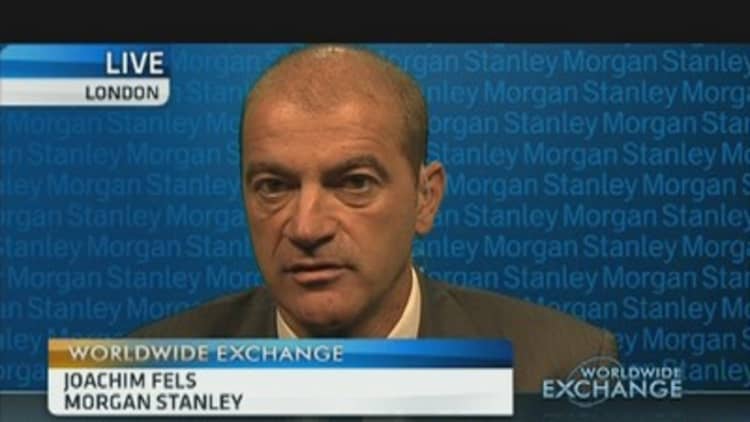Second guessing what will happen next with the euro zone debt crisis is not easy.
Just when you think European Union policy makers have lost control of the situation, a single sentence from the head of the European Central Bank (explain this) or the German chancellor gets investors rushing to buy stocks. Or, when things look good and appear to be on the mend, disagreement between leading players or another round of poor data sends investors into the relative sanctuary of the U.S. debt market.
Investors currently find themselves at yet another euro zone debt crisis crossroads and asking whether the ECB will end up underwriting the debt markets of Europe’s periphery.
What is clear, is that there are many investors who want to believe ECB boss Mario Draghi will ride to the rescue. Just before the Olympics got underway in London, Draghi said the central bank was willing to do “whatever it takes” to protect the euro.
Stocks soared and borrowing costs for Spain and Italy fell on the comments and remain well below their highs of early August. But as we head into yet another round of ‘crucial’ EU meetings over the next four weeks, we are no closer to understanding what doing “whatever it takes” means in practice. (Read More: .)
Over the weekend a report in Germany’s Der Spiegel claimed the ECB is considering plans to cap the borrowing costs of Spain and Italy by buying their debt when yields rise above a certain level.

“This would signal to investors which interest rate levels the ECB believes to be appropriate,” said Der Spiegel. The report was quickly denied by the ECB with the full backing of the , which has consistently said it is against the ECB buying euro zone debt.
With German opposition to the ECB buying debt so entrenched, and previous agreements by EU leaders focusing on the euro zone’s bailout fund as the main conduit for buying peripheral debt, it is telling that markets still move on reports of an imminent use of the so-called big bazooka by the central bank.
“The hope would be that, simply by making an explicit pledge to keep yields below particular levels, the ECB might reduce the chances that it will actually have to wade into the bond market,” said Capital Economics chief European economist Jonathan Loynes in a research note.
Such a view would though be a naively optimistic position, according to Loynes.
“Markets may have been prepared to give euro-zone policymakers the benefit of the doubt in the summer lull of the last few weeks,” he said. “However, with the economic outlook for the region still worsening and fiscal progress proving very slow, they will want to see words soon followed by actions.”
“To be credible, the ECB would therefore quickly have to back up its pledge with hard cash, and any commitment to potentially unlimited purchases would probably require the central bank to undertake full-blown quantitative easing too,” added Loynes, who does not believe buying bonds will ultimately solve Europe’s well-documented problems.
Amid this uncertainty, stocks have had a very strong summer, brushing off the debt crisis, the threat of the U.S. “fiscal cliff” and the prospect of the hard landing in China, making double-digit returns since June. (Read More: Goldman to Clients: Get Out of Stocks Before Fiscal Cliff Hits.)
The VIX — also known as the fear index — has fallen, raising a debate about whether market participants have become over confident about the downside risks facing stocks. (Read More: No, The Vix Isn’t Broken: Jon Najarian.)
Those risks are substantial, according to Philipp Baertschi, chief strategist at Sarasin in Zurich, who is worried about the economic slowdown in the U.S. and the rest of the world.
“Major emerging market countries such as China, Brazil, India, and Korea are in a cyclical downturn. The Euroland is already in recession (explain this), but the indicators with the strongest correlation to the equity market have not yet found a floor,” said Baertschi in a research note.
Stocks will sooner or later catch up with this reality, according to Baertschi.
“The paradoxical situation of rising equity prices and deteriorating economic data will not last long” he noted. “As sentiment is currently positive and hedging costs are low, we recommend investors play it safeand hedge their equity positions. Since we do not anticipate a cyclical recovery in the immediate future but continued weakness, we expect equity prices to drop sharply until the end of the year.”
If Baertschi is right, and euro zone policy makers do not come up with a so-called big bazooka, it will be stock market gains that will be capped, not Spanish and Italian borrowing costs.


